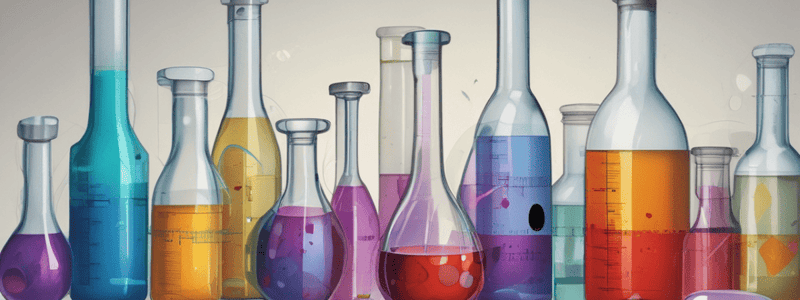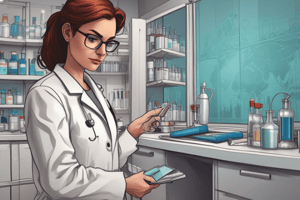Podcast
Questions and Answers
What type of needle is used in the Syringe Method?
What type of needle is used in the Syringe Method?
Double-sided needle
What is the primary advantage of the POCT method?
What is the primary advantage of the POCT method?
Smaller amount of blood
What is the name of the system used in the Vacutainer Method?
What is the name of the system used in the Vacutainer Method?
Multi-draw System
What is the purpose of the 'hub' in the Vacutainer Method?
What is the purpose of the 'hub' in the Vacutainer Method?
What is the range of syringe capacities available in the Syringe Method?
What is the range of syringe capacities available in the Syringe Method?
What is the relationship between needle gauge and needle length in the Syringe Method?
What is the relationship between needle gauge and needle length in the Syringe Method?
What type of fixative is used in Histology?
What type of fixative is used in Histology?
What type of analysis is performed on urine samples?
What type of analysis is performed on urine samples?
What is the anticoagulant used in a gray top blood tube?
What is the anticoagulant used in a gray top blood tube?
Which blood tube is used for a CBC/FBC?
Which blood tube is used for a CBC/FBC?
What is the purpose of a blue top blood tube?
What is the purpose of a blue top blood tube?
Which department is responsible for performing glucose tests?
Which department is responsible for performing glucose tests?
What is the anticoagulant used in a green top blood tube?
What is the anticoagulant used in a green top blood tube?
Which blood tube is used for lipid profile tests?
Which blood tube is used for lipid profile tests?
What is the purpose of a red top blood tube?
What is the purpose of a red top blood tube?
Which department is responsible for performing renal function tests?
Which department is responsible for performing renal function tests?
What is the purpose of a yellow top blood tube?
What is the purpose of a yellow top blood tube?
Which blood tube is used for hematology tests?
Which blood tube is used for hematology tests?
Flashcards are hidden until you start studying
Study Notes
Laboratory Samples
- Blood samples can be collected through arterial puncture, venipuncture, or capillary puncture
- Non-blood samples include stool, urine, sputum, semen, and other bodily fluids
Blood Collection Methods
- Syringe method: uses a slip tip or Luer lock syringe with needles of varying gauges and lengths
- Vacutainer method: uses a double-sided needle and a vacuum-dependent system
Blood Tubes
- Anti-coagulated tubes:
- Gray top (sodium fluoride/potassium oxalate): used for glucose tests
- Purple top (EDTA): used for CBC, ESR, and other hematology tests
- Blue top (sodium citrate): used for coagulation tests (PT, PTT, INR, D-dimer)
- Green top (lithium heparin): used for chemistry tests (electrolytes, enzymes, etc.)
- Non-anti-coagulated tubes:
- Red or yellow (SST) top: used for lipid profiles, renal function tests, and liver function tests
Common Laboratory Tests
- Clinical Chemistry:
- Glucose (FBS, RBS, FBS & 2HRPP, GTT)
- Lipid profile (cholesterol, triglycerides, HDL)
- Renal function tests (BUN, creatinine, uric acid, electrolytes)
- Liver function tests (SGOT, SGPT, ALK PHOS, GGT, bilirubin, etc.)
- Hematology:
- CBC/FBC
- ESR
- Sickle cell test
- Hemoglobin
- Immunology:
- HIV
- Hepatitis A, B, and C
- Dengue fever
- Toxoplasmosis
- Rubella
- Measles
- Herpes simplex virus
- CMV
Studying That Suits You
Use AI to generate personalized quizzes and flashcards to suit your learning preferences.




